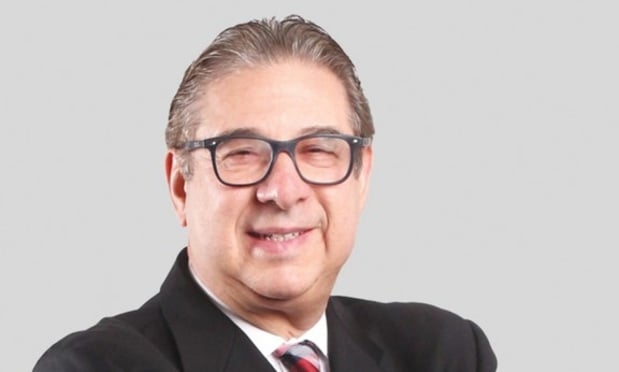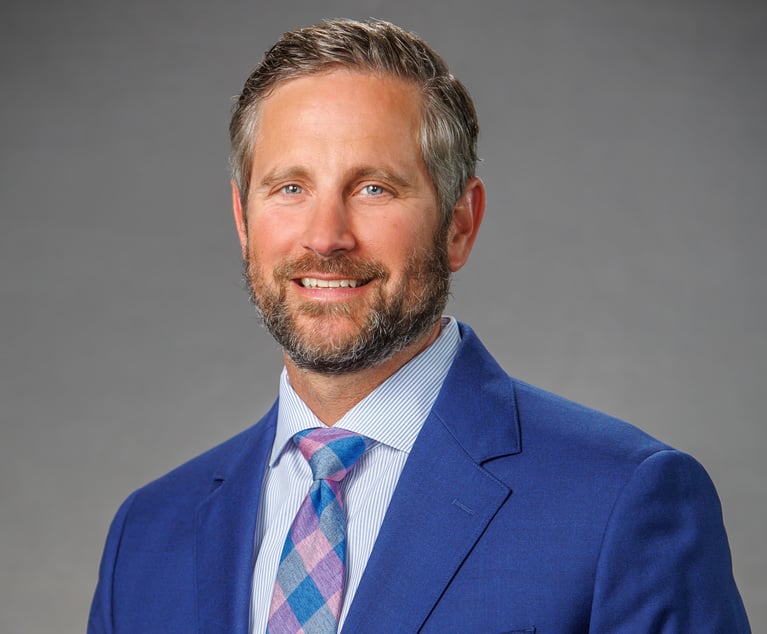Learning the Many Facets of the Practice of Franchise Law
Franchise law can have a steep learning curve because it incorporates other legal disciplines. A student of the law has many options to learn about practicing franchise law, domestically and internationally. It is great that many options for learning exist because there are many facets to the practice.
October 24, 2019 at 12:25 PM
5 minute read
 Craig Tractenberg of Fox Rothschild.
Craig Tractenberg of Fox Rothschild.
Franchise law can have a steep learning curve because it incorporates other legal disciplines. A student of the law has many options to learn about practicing franchise law, domestically and internationally. It is great that many options for learning exist because there are many facets to the practice.
Franchise law encompasses various disciplines.
The basic franchise relationship is determined by contract in the form of a franchise agreement. The franchise agreement is in part a trademark license that is governed by the federal Lanham Act, and in part a trade secrets agreement that can be enforced by the state and federal trade secrets legislation.
Naturally, a franchise agreement prohibits activities that are competitive which may serve to undermine the performance of the franchise granted. These activities may involve covenants not to compete, which are enforceable in some but not all jurisdictions as a matter of decisional law. Choice of law can be an issue, because some jurisdictions may have franchise relationship laws which are fundamental and cannot be evaded using choice of law clauses. Let's also not forget the overlay of employment law, master servant, privacy and vicarious liability issues.
Laws governing the offer and sale of franchises in the United States.
The Federal Trade Commission enforces the Disclosure Requirements and Prohibitions Concerning Franchising and Business Opportunity Ventures, 16 CFR Part 436 (franchises) and 16 CFR Part 437 (business opportunities). All franchises offered within the United States must comply with the FTC rule, which requires a certain format and content of disclosure through a franchise disclosure document. In addition to the FTC rule regulation, many states have the equivalent of blue sky laws governing the offer and sale of franchises to citizens of their state, or to citizens of other states. The FTC rule sets a minimum standard of disclosure and the state regulatory laws set a higher standard. This creates a patchwork quilt of presale registration and disclosure laws that needs to be navigated by franchise practitioners.
Education in franchise law is available at several levels of interest.
Only two franchise law text or casebooks exist for use in teaching franchise law classes in law school. As a result, few law schools have franchise law elective classes but that number is increasing as franchising becomes a dominant method of retail distribution. No law school features a master's program in franchise law. The California Bar Board of Legal Specialization does provide a certification in franchise law for California practitioners.
The state bar associations do provide usually one-day programming for learning franchise law. Usually the programs are for those who need to learn franchise law at the basic level for counseling buyers and sellers of franchises, and franchised operators within a franchise system. Typical offerings include classes on buying and selling franchise businesses, and some introduction to common issues in the offer and sale of franchises, and the state regulatory environment. State bar association programs are helpful for those with episodic exposure to franchise issues.
The International Franchise Association is the voice of international franchising and lobbies for the franchise industry. It consists and protects both franchisor and franchisee issues, and has a two-day annual legal symposium for practitioners. Examples of sessions include a "Judicial Update," "Talk with the Regulators," "Trade Secret Enforcement," "Cross-Border Development" and "Privacy Issues." The IFA has thousands of members, both franchisors and franchisees, and the symposium has average attendance of about 400 professionals and CLE credit is available. Franchise law education is only one facet of the work of the IFA, as demonstrated by the annual IFA convention with over 3,000 attendees, plus exhibitors.
The American Bar Association has a forum committee on franchising that is focused solely on franchise law education. In contrast to many bar association membership trends, the forum is increasing attendance with 902 attendees this year, at its annual meeting. The educational sessions like the IFA legal symposium includes introductory courses and a judicial update, but also has an ethics offering, courses of special interest to counsel to franchisees, litigation and dispute resolution training courses, and this year, a local government official from Denver to talk about the franchising of cannabis stores.
Many attend the IFA legal symposium and the ABA forum on franchising for the networking opportunities. In addition to these associations and the state bar associations, the International Bar Association also has an international franchise law committee, which provides programming for cross-border franchise practitioners. Though the franchise educational offerings are for a narrow group, the IBA convention is designed for networking with about 6,000 lawyers attending with many practice areas, including human rights, with world class practitioners and jurists.
Unlike the IBA, which requires membership to access their presentation materials, the IFA and the ABA forum have their materials available online, or at minimal cost. The ABA forum also publishes the Franchise Law Journal, the Franchise Lawyer newsletter, and related paperback books. The presenters and speakers are rotated with the intent to give others opportunities while pairing the experienced presenters to create the best sessions.
Finally, you can always count on this publication to provide important franchise law information. Enjoy our abundant learning opportunities.
Craig R. Tractenberg is a partner and co-chair of the franchise and distribution practice group at Fox Rothschild where he handles complex business disputes involving intellectual property, licenses, business torts and insolvency issues. He focuses his practice on franchise companies' development and expansion. Contact him at [email protected].
This content has been archived. It is available through our partners, LexisNexis® and Bloomberg Law.
To view this content, please continue to their sites.
Not a Lexis Subscriber?
Subscribe Now
Not a Bloomberg Law Subscriber?
Subscribe Now
NOT FOR REPRINT
© 2025 ALM Global, LLC, All Rights Reserved. Request academic re-use from www.copyright.com. All other uses, submit a request to [email protected]. For more information visit Asset & Logo Licensing.
You Might Like
View All

Products Liability: The Absence of Other Similar Claims—a Defense or a Misleading Effort to Sway a Jury?


K&L Gates Sheds Space, but Will Stay in Flagship Pittsburgh Office After Lease Renewal
Trending Stories
- 1'It's Not Going to Be Pretty': PayPal, Capital One Face Novel Class Actions Over 'Poaching' Commissions Owed Influencers
- 211th Circuit Rejects Trump's Emergency Request as DOJ Prepares to Release Special Counsel's Final Report
- 3Supreme Court Takes Up Challenge to ACA Task Force
- 4'Tragedy of Unspeakable Proportions:' Could Edison, DWP, Face Lawsuits Over LA Wildfires?
- 5Meta Pulls Plug on DEI Programs
Who Got The Work
Michael G. Bongiorno, Andrew Scott Dulberg and Elizabeth E. Driscoll from Wilmer Cutler Pickering Hale and Dorr have stepped in to represent Symbotic Inc., an A.I.-enabled technology platform that focuses on increasing supply chain efficiency, and other defendants in a pending shareholder derivative lawsuit. The case, filed Oct. 2 in Massachusetts District Court by the Brown Law Firm on behalf of Stephen Austen, accuses certain officers and directors of misleading investors in regard to Symbotic's potential for margin growth by failing to disclose that the company was not equipped to timely deploy its systems or manage expenses through project delays. The case, assigned to U.S. District Judge Nathaniel M. Gorton, is 1:24-cv-12522, Austen v. Cohen et al.
Who Got The Work
Edmund Polubinski and Marie Killmond of Davis Polk & Wardwell have entered appearances for data platform software development company MongoDB and other defendants in a pending shareholder derivative lawsuit. The action, filed Oct. 7 in New York Southern District Court by the Brown Law Firm, accuses the company's directors and/or officers of falsely expressing confidence in the company’s restructuring of its sales incentive plan and downplaying the severity of decreases in its upfront commitments. The case is 1:24-cv-07594, Roy v. Ittycheria et al.
Who Got The Work
Amy O. Bruchs and Kurt F. Ellison of Michael Best & Friedrich have entered appearances for Epic Systems Corp. in a pending employment discrimination lawsuit. The suit was filed Sept. 7 in Wisconsin Western District Court by Levine Eisberner LLC and Siri & Glimstad on behalf of a project manager who claims that he was wrongfully terminated after applying for a religious exemption to the defendant's COVID-19 vaccine mandate. The case, assigned to U.S. Magistrate Judge Anita Marie Boor, is 3:24-cv-00630, Secker, Nathan v. Epic Systems Corporation.
Who Got The Work
David X. Sullivan, Thomas J. Finn and Gregory A. Hall from McCarter & English have entered appearances for Sunrun Installation Services in a pending civil rights lawsuit. The complaint was filed Sept. 4 in Connecticut District Court by attorney Robert M. Berke on behalf of former employee George Edward Steins, who was arrested and charged with employing an unregistered home improvement salesperson. The complaint alleges that had Sunrun informed the Connecticut Department of Consumer Protection that the plaintiff's employment had ended in 2017 and that he no longer held Sunrun's home improvement contractor license, he would not have been hit with charges, which were dismissed in May 2024. The case, assigned to U.S. District Judge Jeffrey A. Meyer, is 3:24-cv-01423, Steins v. Sunrun, Inc. et al.
Who Got The Work
Greenberg Traurig shareholder Joshua L. Raskin has entered an appearance for boohoo.com UK Ltd. in a pending patent infringement lawsuit. The suit, filed Sept. 3 in Texas Eastern District Court by Rozier Hardt McDonough on behalf of Alto Dynamics, asserts five patents related to an online shopping platform. The case, assigned to U.S. District Judge Rodney Gilstrap, is 2:24-cv-00719, Alto Dynamics, LLC v. boohoo.com UK Limited.
Featured Firms
Law Offices of Gary Martin Hays & Associates, P.C.
(470) 294-1674
Law Offices of Mark E. Salomone
(857) 444-6468
Smith & Hassler
(713) 739-1250





